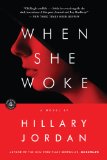Summary | Excerpt | Reading Guide | Discuss | Reviews | Beyond the Book | Read-Alikes | Genres & Themes | Author Bio

A Novel
by Hillary JordanThis article relates to When She Woke
The United States started adopting laws restricting abortion in the early 1800s, ultimately outlawing it in most states by the turn of the century. Interestingly, at the time, abortion wasn't proscribed as a moral issue the same way it is today; it was criminalized primarily because it was a dangerous practice with very high mortality rates, before the advent of antiseptics and antibiotics. These laws didn't necessarily stop the abortions from being performed, however. According to an article in The Atlantic, "The American Medical Association's crusade against abortion was partly a professional move, to establish the supremacy of 'regular' physicians over midwives and homeopaths... Nonetheless, having achieved their legal goal, many doctors - including prominent members of the AMA - went right on providing abortions."
 Withal, bans remained until the landmark Supreme Court case Roe v. Wade was decided on January 22, 1973, declaring many of the existing state abortion laws unconstitutional. Plaintiff Norma McCorvey ("Jane Roe") was born in 1947 and dropped out of high school at the age of 14. Her first child, born in 1965, was raised by McCorvey's mother and her second was put up for adoption. When she became pregnant for the third time, she decided to not have the baby. She first tried to obtain a legal abortion, claiming the pregnancy was the result of rape. There was no evidence of this (and she later admitted the story was fabricated), and so she was denied the procedure. She then tried to obtain an illegal abortion, but couldn't find anyone to perform it for her.
Withal, bans remained until the landmark Supreme Court case Roe v. Wade was decided on January 22, 1973, declaring many of the existing state abortion laws unconstitutional. Plaintiff Norma McCorvey ("Jane Roe") was born in 1947 and dropped out of high school at the age of 14. Her first child, born in 1965, was raised by McCorvey's mother and her second was put up for adoption. When she became pregnant for the third time, she decided to not have the baby. She first tried to obtain a legal abortion, claiming the pregnancy was the result of rape. There was no evidence of this (and she later admitted the story was fabricated), and so she was denied the procedure. She then tried to obtain an illegal abortion, but couldn't find anyone to perform it for her.
Meanwhile, attorneys Linda Coffee and Sarah Weddington were trying to construct a case that would challenge existing abortion laws and were seeking a woman who wanted an abortion but didn't have the means to obtain one. They were introduced to McCorvey who agreed to be part of the suit, and Coffee and Weddington filed at the Dallas federal courthouse on March 3, 1970. Henry B. Wade, the district attorney of Dallas County, TX, was named the defendant, although the case was actually defended by Assistant District Attorney John Tolle. Roe v. Wade was heard by the Fifth Circuit federal court on May 22, 1970. On June 17, the three-judge panel issued their unanimous decision: "The Texas abortion laws must be declared unconstitutional because they deprive single women and married couples of their right, secured by the Ninth Amendment, to choose whether to have children." Tolle took the matter to the Supreme Court, which concurred with the lower court's ruling and issued its own opinion in early 1973.
More recently, the highly disputed "Personhood Initiative" - a law that would consider a fertilized egg a person and grant legal rights to the embryo - caused quite a stir in both "pro-life" and "pro-choice" circles.
Roe vs. Wade continues to be controversial today. While many approve of the decision, many oppose it, particularly the Roman Catholic Church and theologically conservative Christian groups. McCorvey herself sought to have the decision overturned in 2005 and actively supports pro-life causes.
Filed under Society and Politics
![]() This "beyond the book article" relates to When She Woke. It originally ran in November 2011 and has been updated for the
September 2012 paperback edition.
Go to magazine.
This "beyond the book article" relates to When She Woke. It originally ran in November 2011 and has been updated for the
September 2012 paperback edition.
Go to magazine.
Your guide toexceptional books
BookBrowse seeks out and recommends the best in contemporary fiction and nonfiction—books that not only engage and entertain but also deepen our understanding of ourselves and the world around us.